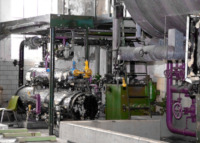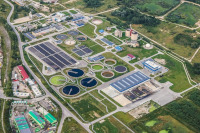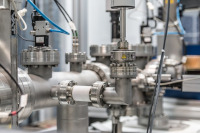Occupational Categories
There are four occupational categories of Stationary Engineers that come under the jurisdiction of Union Local 39. These four categories are as follows: Stationary Engineer, Stationary Engineer/Wastewater Treatment Operator, Stationary Engineer/Water Treatment Plant Operator and Biomed Equipment Technician. The following text defines the job descriptions of these four categories of Stationary Engineers on a limited basis.

Stationary Engineer
Stationary Engineers operate and maintain equipment in buildings such as boilers, pumps, fans, compressors, refrigeration and air conditioning units and systems, motors, automated controls and electrical apparatus, just to name a few.
Engineers are responsible for the safe, efficient operation of all systems under their control. They make regular rounds of equipment areas, reading meters and gauges, listening to the machinery and adjusting the controls as required. Periodically, they perform tests and take corrective action, such as adding chemicals to the boilers to prevent corrosion and scale. In large automated facilities engineers in the central control room monitor conditions throughout the plant by watching computer monitor screens and checking print-outs that show instrument readings from machinery in remote locations. They may be able to make adjustments by typing commands to the main computer on the computer terminal keyboard.
If machinery breaks down or malfunctions occur, engineers are responsible for the necessary repairs. Using hand and power tools, they may replace or modify defective parts, fabricate new parts or completely overhaul the equipment. Depending on where they work, engineers also service industrial machinery, hospital equipment, plumbing fixtures, conveyors and other electrical or mechanical devices used on the premises. They also keep logs of test results, instrument readings and preventive or corrective maintenance work performed.
Engineers work in hospitals, hotels, food processing and other industrial plants, public and private office buildings, wastewater plants, drinking water plants and airports. Some perform traveling maintenance work for building service firms.

Stationary Engineer/Wastewater Treatment Plant Operator
The Stationary Engineer/Wastewater Treatment Plant Operator operates sewage treatment, sludge processing, and disposal equipment in a wastewater (sewage) treatment plant to control flow and processing of sewage. They monitor control panels and adjust valves and gates manually or by remote control to regulate flow of sewage. They also observe variations of operating conditions and interpret meter and gauge readings and test results to determine load requirements. Their job description also entails starting and stopping pumps, engines, and generators to control flow of raw sewage through filtering, settling, aeration, and sludge digestion processes. They also maintain logs of operations and record meter and gauge readings.

Stationary Engineer/Water Treatment Plant Operator
The Stationary Engineer/Water Treatment Plant Operator controls treatment plant machines and equipment to purify and clarify water for human consumption and for industrial use. They operate and control electric motors, pumps, and valves to regulate flow of raw water into treating plant. They also dump specified amounts of chemicals, such as chlorine, ammonia, and lime into water or adjust automatic devices that admit specified amounts of chemicals into tanks to disinfect, deodorize, and clarify water. Start agitators to mix chemicals and allows impurities to settle to bottom of tank. They turn valves to regulate water through filter beds to remove impurities and then they pump purified water into water mains. They monitor panelboards and adjust controls to regulate flow rates, loss of head pressure and water elevation, and distribution of water. They clean tanks and filter beds, using backwashing (reverse flow of water). Their job description also includes repairing and lubricating machines and equipment, using handtools and power tools. They test water samples to determine acidity, color, and impurities, using colorimeter, turbidimeter, and conductivity meter. They also add chemicals into tanks to coagulate impurities and to reduce acidity. They record data, such as residual content of chemicals, water turbidity, and water pressure.

Biomed Equipment Technican
The Biomed Equipment Technicain tests and repairs electromedical equipment that can be found in hospitals or hospital surroundings. Some of the equipment that falls into the scope of a Biomed Technician would be electrocardiographs, x-ray machines, electroencephalographs, sterilizers, operating room lamps and tables, and diathermy machines. Repairs and maintenance are accomplished following schematic diagrams and using handtools and test meters. The technician tests electrical circuits and components to locate shorts, faulty connections, and defective parts, using test meters. They solder loose connections and replace defective parts, such as tubes, transformers, resistors, condensers, and switches, using handtools and soldering iron. They disassemble equipment and repair or replace faulty mechanical parts.